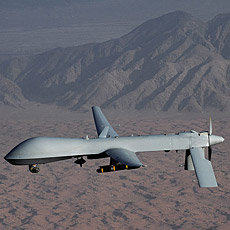
Targeted Killings
ACLU

The United States has reportedly initiated a targeted killing program under which the CIA and the military have the authority to hunt and kill individuals, including U.S. citizens, far away from the battlefields in Iraq, Afghanistan and even the Pakistani border regions, and potentially anywhere in the world. The program operates without any checks and balances; all of the essential details about the program remain secret. We do not know what criteria are used to put people on the "kill lists" maintained by the CIA and military, how much evidence is required to add a person to the lists, or whether there are any geographical limits on where individuals can be targeted. The President has, in effect, claimed the unchecked authority to put the names of citizens and others on "kill lists" on the basis of a secret determination, based on secret evidence, that a person meets a secret definition of the enemy.
It is not enough for the government to say "trust us" when it comes to authorizing the CIA to hunt and kill U.S. citizens and others all over the world. Over the last eight years, we have seen the government over and over again detain men as "terrorists," only to discover later that the evidence was weak, wrong, or non-existent. Of the many hundreds of individuals previously imprisoned in the so-called "war on terror," the vast majority have been released or are awaiting release because the government's secret evidence against them could not withstand scrutiny. These types of mistakes are even more unacceptable when the consequence is death.
Furthermore, outside of armed conflict zones, the use of lethal force is strictly limited by international law and, when it comes to U.S. citizens, the Constitution. Specifically, lethal force can be used only against an imminent threat to life and, even then, only as genuine last resort once other alternatives have been exhausted. A program under which names are added to a "kill list" after a secret bureaucratic process and remain there for months is clearly not limited to imminent threats.
While it has been reported that at least 3 U.S. citizens have been put on the government's targeted killing list, the identity of only one of those people has been reported: Anwar al-Aulaqi. In early July, the ACLU and co-counsel the Center for Constitutional Rights were retained by Nasser al-Aulaqi — Anwar al-Aulaqi's father — to provide uncompensated legal representation in order to mount a constitutional challenge. The ACLU and CCR were originally prevented from bringing this challenge, however, by the Treasury Department's Office of Foreign Assets Control ("OFAC"). On July 16, 2010, many months after the government had made clear its intention to kill Anwar al-Aulaqi, OFAC undertook to freeze his assets. These rules did not just freeze Aulaqi's assets; they made it illegal for any attorney to provide "legal services" on his behalf without first obtaining a license. In other words, the same government that is seeking to kill a U.S. citizen took steps to prohibit attorneys from testing the legality of the government's decision to kill him. The ACLU and CCR sued the Treasury Department over the denial of the license, and the next day it was granted.
On August 30, the ACLU and CCR filed a lawsuit challenging the government's asserted authority to carry out “targeted killings” of U.S. citizens located far from any armed conflict zone. The ACLU believes that the executive branch's claimed authority to impose an extrajudicial death sentence on U.S. citizens and others found far from any actual battlefield violates both the Constitution and international law.
The ACLU has also filed a Freedom of Information Act (FOIA) lawsuit demanding that the government disclose basic information about the use of drones to conduct targeted killings. The lawsuit seeks disclosure of the legal basis, scope, and limits on the targeted killing program; information about internal oversight of the program; and data about the number of civilians and non-civilians killed in drone strikes.
Sept. 5, 2010
